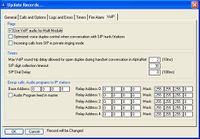New fields (AlphaPro 10.27): Difference between revisions
From Zenitel Wiki
| Line 24: | Line 24: | ||
* '''Audio Program feed in master''': When this flag is enabled [[Audio Program]]s need only to be connected to the master in a [[MultiModule]]. When the flag is disabled Audio Program must be connected in parallel to all modules, as before. | * '''Audio Program feed in master''': When this flag is enabled [[Audio Program]]s need only to be connected to the master in a [[MultiModule]]. When the flag is disabled Audio Program must be connected in parallel to all modules, as before. | ||
:Exchange reset is needed after | :Exchange reset is needed after changing the flag. | ||
Revision as of 12:21, 28 August 2007
Exchange & System -> System -> VoIP
Flags
- Use VoIP audio for Multi Module: Disable this flag when using AGA or AE1 for audio distribution in MultiModule, and not VoIP. Note that it is also possible to use a mix of VoIP audio and conventional AGA/AE1 links. Then this flag must be enabled.
- Optimized voice duplex control when conversation with SIP/trunk/stations: When calling SIP there can be problems with the standard duplex algorithm due to DSP echo cancelling in the SIP station. A new duplex algorithm is available for duplex towards SIP stations that is speech controlled only from volume of the microphone signal from the SIP link. When this flag is set, the initial voice direction is forced to be from the intercom towards the telephone. When the phone operator starts to speak, the voice direction will switch towards the intercom station, regardless of the level of the audio signal from the intercom station. As soon as the phone operator stops speaking, the voice direction will switch back to the initial direction.
- Incoming calls from SIP in private ringing mode: When enabled incoming calls from SIP trunk line or SIP phones will be forced in private ringing mode, regardless of the private/open switch of the intercom station (this flag is moved from Exchange & System -> System -> Calls and Options).
Timers
- Max VoIP round trip delay allowed for open duplex during handset conversation in AlphaNet:
- AlphaNet calls: The roundtrip delay on a VoIP AlphaNet conversation is measured by the AlphaCom. If the delay is more than the value specified in this parameter, a handset to handset conversation will be forced in voice switched duplex. This is to prevent echo in the handset due to crosstalk in AlphaCom handset (and no echo cancelling).
- SIP calls: When talking with handset conversation between Intergard station and SIP station the SIP station will get echo in the handset due to crosstalk in AlphaCom handset (and no echo cancelling). Due to this handset to handset communication will be forced in duplex. (Default delay setting for SIP = 30ms. Full duplex can be obtained if this parameter is adjusted to 40 ms or more)
- SIP digit collection timeout: Specifies how long the AlphaCom should wait for more digits before setting up the connection to a SIP device. The timeout is used by feature 81 and feature 83 when the field "Collect N more digits (SIP)" is used.
- SIP Dial Delay: After having made a connection to a SIP gateway, further dialing is delayed by the time specified by this timer.
Groupcalls, Audio programs to IP stations
- Base Address:
- Relay Address and Mask 0 - 4:
- Audio Program feed in master: When this flag is enabled Audio Programs need only to be connected to the master in a MultiModule. When the flag is disabled Audio Program must be connected in parallel to all modules, as before.
- Exchange reset is needed after changing the flag.
.ex_profile.glob_const.priv_ring_mail_pri
.ex_profile.glob_const.bc_event_node

